
Orchids are plants that belong to the family Orchidaceae, a diverse and widespread group of flowering plants with blooms that are often colourful and fragrant. Orchids are cosmopolitan plants that are found in almost every habitat on Earth except glaciers. The world's richest diversity of orchid genera and species is found in the tropics.
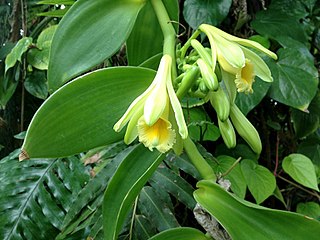
Vanilla is a spice derived from orchids of the genus Vanilla, primarily obtained from pods of the flat-leaved vanilla (V. planifolia).

Adelbert von Chamisso was a German poet,writer and botanist. He was commonly known in French as Adelbert de Chamissode Boncourt, a name referring to the family estate at Boncourt.
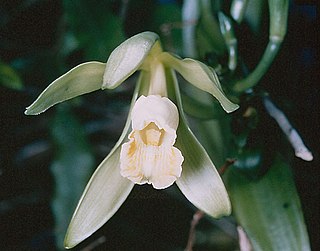
Vanilla, the vanilla orchids, forms a flowering plant genus of about 110 species in the orchid family (Orchidaceae). The most widely known member is the flat-leaved vanilla, native to Mexico and Belize, from which commercial vanilla flavoring is derived. It is the only orchid widely used for industrial purposes in flavoring such products as foods, beverages and cosmetics, and is recognized as the most popular aroma and flavor. The key constituent imparting its flavour is the phenolic aldehyde, vanillin.
Bush lupin or bush lupine is a common name applied to a number of shrubby species of lupin:

Philodryas chamissonis, commonly known as the Chilean green racer and the Chilean long-tailed snake, is a species of moderately venomous opisthoglyphous (rear-fanged) snake in the family Colubridae. The species is endemic to Chile.
Coastal strand is a plant community of flowering plants that form along the shore in loose sand just above the high tide line.
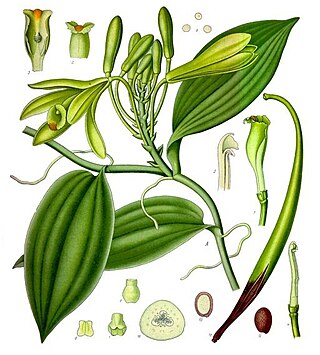
Vanilla planifolia is a species of vanilla orchid native to Mexico, Central America, Colombia, and Brazil. It is one of the primary sources for vanilla flavouring, due to its high vanillin content. Common names include flat-leaved vanilla, and West Indian vanilla. Often, it is simply referred to as "the vanilla". It was first scientifically named in 1808. With the species' population in decline and its habitats being converted to other purposes, the IUCN has assessed Vanilla planifolia as Endangered.

Platanthera chlorantha, commonly known as greater butterfly-orchid, is a species of orchid in the genus Platanthera. It can be found throughout Europe and Morocco. The name Platanthera is derived from Greek, meaning "broad anthers", while the species name, chlorantha, means "green-flowered".

Spiranthes romanzoffiana, commonly known as hooded lady's tresses or Irish lady's-tresses, is a species of orchid. Collected by Chamisso during the Romanzov expedition it was described by him in 1828 and named for Count Nikolay Rumyantsev who financed the expedition. This orchid is native to North America, Ireland and the British Isles.

Leptotes bicolor is a species of orchid native to Paraguay and southern Brazil. It is the type species of the genus Leptotes. Its flowers and fruits are used as a substitute for vanilla in milk and ice cream.

Vanilla humblotii is a species of orchid endemic to Madagascar and the island of Grande Comore in the Comoros Islands. Both are off Africa in the Indian Ocean. They are an endangered species, with a low population caused by anthropogenic activity. They live on dry, rocky mountains and in mesophilous forests. Vanilla humblotii have no leaves and are characterized by canary yellow flowers with a red velvet lip. They are known to have applications in medicine due to its antimicrobial properties, so it is important to protect them for future use.

Vanilla pompona is a species of vanilla orchid. It is native to Mexico and northern South America, and is one of the sources for vanilla flavouring, due to its high vanillin content.
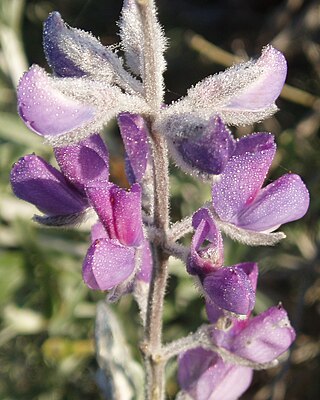
Lupinus chamissonis is a species of lupine known by the common name Chamisso bush lupine. It is endemic to California, where it is known from most of the length of the coastline. It grows in sand dunes and other immediate coastal habitat.

Vanilla polylepis is a climbing orchid species in the plant family Orchidaceae. It is native to tropical Africa, with a range spanning the width of the continent, from Kenya to Angola. It grows in high-altitude evergreen and swamp forests between 1,200–1,500 m (3,900–4,900 ft) and is often found growing on trees bordering rivers and waterfalls. Plants produce bright green, fleshy stems, 10–12 mm (0.39–0.47 in) in diameter, with large, glossy leaves. White, aerial roots form on the stems allowing the orchids to attach themselves to trees for support. As with many orchids, they produce showy flowers, which in the case of V. polylepis are white and yellow with a pink to maroon blotch. This differentiates them from similar species. They have seedpod-like fruits, called capsules, which produce a distinctive aroma as they dry. They are closely related to the well-known species Vanilla planifolia, whose seed pods are used commercially in the production of vanilla flavouring.

Arnica chamissonis, the Chamisso arnica, is a North American species of plants in the family Asteraceae. It is very similar to Arnica montana. Arnica chamissonis is native to North America and naturalized in parts of Europe while A. montana is indigenous to Europe.

Gymnadenia rhellicani is a European species of orchid.
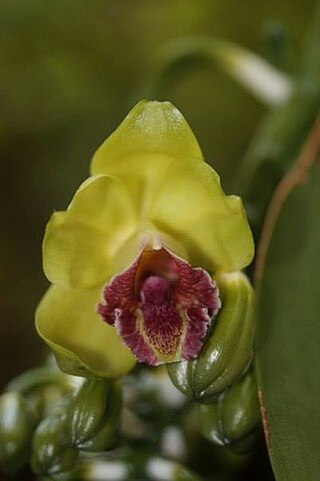
Vanilla raabii is a species of orchid in the genus Vanilla. It is endemic to the Philippines and can be found on Luzon, the Panay Peninsula, and Samar.
Diphyes is a genus of hydrozoans belonging to the family Diphyidae.
















